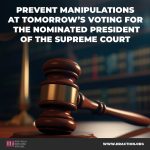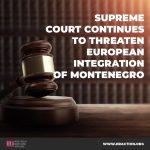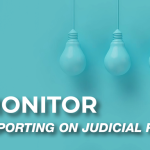N2.BN – BRIEF NEWS
20/11/2024
N1.T3 – Vesna Medenica in Court Proceedings: Hearings Delayed 23 Times Across Two Criminal Cases
20/11/2024N1.T2 – Ninth Attempt to Elect the President of the Supreme Court of Montenegro

HRA NEWSLETTER 1 – TOPIC 2
Since Vesna Medenica stepped down as President of the Supreme Court at the end of December 2020, Montenegro’s highest judicial authority has operated without a full-term president. The position has remained in an “acting status” since September 2021.
Since January 2021, there have been eight unsuccessful attempts to advertise the position of President of the Supreme Court. The primary reason for not finalizing the election process has been the candidates’ inability to secure the necessary two-thirds majority of votes from judges during the General Session of the Supreme Court; this issue arose four times. In three instances, the voting process was marred by judges submitting invalid ballots, while in the fourth attempt, there were six invalid ballots. In the subsequent attempts, the seventh had five invalid ballots, and the eighth mirrored that same count.
The election protocol stipulates that a candidate must receive the required majority of votes at the General Session of the Supreme Court to be proposed to the Judicial Council, which makes the final decision on the nomination. To date, the Council has not approved the proposed candidates in two instances—specifically, during the voting for Supreme Court judges Miraš Radović and Vesna Vučković.
Following the failure of the eighth competition, the NGO Human Rights Action (HRA) remarked that “the inability of the Supreme Court to approve the election proposal for its president once again highlights the institution’s unpreparedness for Montenegro’s European integration.”
In response, the Law on the Judicial Council and Judges was amended to facilitate the election process. Under the new rules, judges are allowed to vote for three candidates instead of just one, and there will be two rounds of voting. If none of the registered candidates secures the necessary majority in the first round, voting will be repeated among those who receive more than a quarter of the total votes from Supreme Court judges. If no candidate achieves the required majority in the second round—more than half of the total votes—this will indicate that the candidate proposal for the Supreme Court presidency has not been approved.
On July 10, 2024, the Judicial Council announced the ninth public competition for the President of the Supreme Court. Four candidates applied: two judges of the Supreme Court, the president of the Administrative Court, and a former High Court judge turned representative of Montenegro before the European Court of Human Rights. The election process could not be finalized until the amendments and supplements to the Rules of Procedure of the General Session of the Supreme Court were adopted, which occurred on October 18.
The amendments to the above document specify that if a candidate for the competition is a Supreme Court judge and another candidate is not, the Supreme Court judge who is participating in the competition will not be allowed to take part in the General Session’s work, voting, or decision-making. Consequently, the total number of judges counted for the majority will be reduced by the vote of the Supreme Court judge who is a candidate.
However, despite the Judicial Council’s recommendation and the Human Rights Action (HRA) proposal, the Rules of Procedure did not clarify the meaning of the term “total number of judges of the Supreme Court” from which the majority needed to elect a candidate is calculated. This ambiguity likely refers to the number of judges prescribed by the Systemization of Job Positions, which is 19. This creates a challenge for the election process, as there are currently only 17 judges eligible to vote. As a result, the majority of votes required for a candidate to secure election unjustifiably increases from 9 to 10.
At the beginning of November, Minister of Justice Bojan Božović addressed the Parliament of Montenegro, highlighting the urgent need to elect the head of the Supreme Court. He noted that the president of Montenegro’s highest judicial body should be elected as soon as possible, deeming it a pressing issue. Božović explained that, according to the reform agenda, Montenegro is obligated to elect the head of the Supreme Court by the end of the year. Failure to do so could jeopardize the state’s funding from the EU Enlargement Plan for the Western Balkans, which amounts to nearly EUR 30 million.
“The European Commission may not strictly enforce the year-end deadline, even though we are bound by this agenda, but it will certainly not view us favorably if we enter the next year without resolving this issue,” Božović remarked.
As for the ninth attempt to elect the head of the Supreme Court, interviews with the candidates are scheduled for November 19, exactly four months after the competition closed.
HRA NEWSLETTER 1
- N1.T1 – High Court Judges in Podgorica Appeal: Current Number of Judges Insufficient to Address Case Backlog
- N1.T2 – Ninth Attempt to Elect the President of the Supreme Court of Montenegro
- N1.T3 – Vesna Medenica in Court Proceedings: Hearings Delayed 23 Times Across Two Criminal Cases
- N1.T4 – CEPEJ Shows Significantly Reduced Efficiency of the Montenegrin Judiciary
- N1.T5 – Judges Declare November Work Stoppage in Demand for Higher Salaries
- N1.T6 – Constitutional Court Fails to Notify Montenegro’s National Assembly of Judges’ Terminations, Ignoring Statutory Obligation
- N1.T7 – Inertness of the Judicial Council Is Threatening the Transparency and Independence of the Judiciary






 English
English Montenegrin
Montenegrin